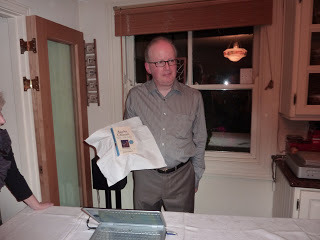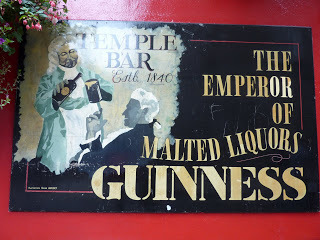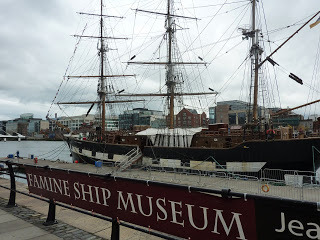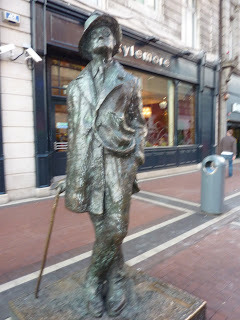Martin Edwards's Blog, page 259
September 11, 2011
Memento - review
Memento, directed by Christopher Nolan, is unquestionably a film that needs to be seen more than once. Even if you figure out what is going on in good time during the first viewing (and I have to admit that I didn't), it is a film that really does repay careful study.
The idea – based on a short story written by Jonathan Nolan, the director's brother – is fascinating. There are two contrasting sequences – a chronological sequence of events, shown in black and white, and a reverse sequence, showing colour. This effect is confusing and unsettling, but also intriguing.
Guy Pearce plays the part of Leonard, a young insurance investigator, who is determined to avenge the death of his wife, who was raped and murdered by one or more intruders. During the attack, he was hit on the head, and as a result, he loses his short-term memory. To keep his investigation on track, he has vital clues tattooed on his body, takes Polaroid photographs of various people and places, and makes notes on the wall chart that he keeps in his motel room.
Leonard is, to say the least, an unreliable narrator. As a result of his unreliability, it isn't easy to get a handle on exactly what has happened. But it is definitely worth making the effort. This is a very interesting film by one of the most interesting contemporary film directors.
September 8, 2011
Forgotten Book - Blueprint for Murder
My choice for today's Forgotten Book is another entry in the impressive new series of classic crime novels published by Arcturus. This one is called Blueprint for Murder, and the author is Roger Bax. If the name of Roger Bax is unfamiliar to you, you might be familiar with the work of Andrew Garve. Both were among the pseudonyms used by the journalist and prolific author Paul Winterton, but it is as Garve that he carved out a considerable reputation.
I had never previously read any of the books he wrote as Roger Bax, but even if I had not known the identity of the author before reading the book, I might have guessed it because of the focus on small boat sailing – clearly this was one of Winterton's great passions.
The book changes character in its last quarter. It starts out as an "inverted" crime novel, tracing how a man made ruthless by his wartime experiences sets out to kill a wealthy benefactor, contriving an ingenious alibi so as to escape justice. But his plan has some rather obvious flaws, and after it falls apart, but the book is in the form of an adventure thriller as he tries to flee across the Channel.
The book is set in the immediate post-war period, and the horrors of the concentration camp that so corrupted the villain are conveyed tersely but well. This is a readable and entertaining story, and although the outcome is only foreseeable, I enjoyed it from start to finish. Had it not been reissued, I'm sure I would never come across it, and Arcturus are to be congratulated for publishing a novel that, although hardly well-known, deserves a new lease of life as a lively period piece.
Travels
It's more than a year since I had a full week off on holiday, so suffice to say, I'm more than ready for a decent trip away. Mind you, in the past twelve months, I have had quite a number of hugely enjoyable long week-ends, as well as four nights in Rome, so I'm not complaining.
However, the chance to recharge my batteries at greater length is something I've been looking forward to and I hope to make the most of it - and do plenty of reading too! I have scheduled in advance regular blog posts as usual, but as I shall not have regular access to the internet over the next ten days, please forgive me if I'm slow in publishing or responding to any comments.
And I'll soon be back, duly refreshed and - I hope! - in the right frame of mind to get going with my next novel...
September 6, 2011
Key Largo
Key Largo is a classic black and white thriller, set on one of the Florida Keys during the hurricane season. The cast is outstanding, with Humphrey Bogart, Lauren Bacall, Edward G. Robinson and Claire Trevor. I enjoyed it.
The story is straightforward. Bogey drops in at a hotel on Key Largo, to see the owner and his daughter, having fought alongside the owner's late son during the war. It's apparent that Bogey was a war hero, but he gives the impression that his colleague, Temple, was the heroic one. And this idea of heroiosm is a key element in the story. At some points, Bogey's character appears weak and irresolute. But the viewer is always optimistic that he will in the end assert himself - and that's a tribute to the iconic actor's powerful character.
A supposed fishing party, whose members are rather disagreeable, is staying at the hotel. It turns out that they are a gang of crooks, led by Johnny Rocco - played by Edward G. Robinson. The battle of wills between Robinson and Bogart is as compelling as the chemistry between Bacall and Bogart.
A word for Claire Trevor, who plays a drunken former nightclub singer. She puts in a very good performance, and plays a crucial part in the story-line. The story is sound, but it's the acting, and the powerful personalities of the actors, that make this movie memorable.
September 5, 2011
A Criminally Good Break


When Agatha Christie's Secret Notebooks, by John Curran, was published, I felt that it was the most fascinating book about the genre that I had read for a long time. The notebooks that John Curran has so painstakingly transcribed give a fascinating insight into the thought processes of the most successful crime writer of all time.
So when John invited me to attend the launch in Dublin of his follow-up volume, Agatha Christie's Murder in the Making, I seized the chance to combine the get-together with a long weekend in the Irish capital. And it all worked out marvellously well – even the weather was pretty kind.
The launch was held at a prestigious venue, the Civic Offices on the banks of the River Liffey, and was attended by well over 100 people. The following evening saw a private party hosted by friends of John at their house in Clontarf, which was another highly enjoyable event. Amongst the highlights, as the photograph shows, was the production (and consumption!) Of a cake featuring a facsimile of the book. Mathew Prichard, Christie's grandson (and the father of James Prichard, whose Langtail Press I have featured a few times in this blog) was present on both evenings, and there's no doubt that his support of the project has been crucial to the success of John's work, and that it has been absolutely justified by the dedication John has shown.
I'll be reviewing the book shortly, and I'm delighted that its publication gave me the excuse (if one were needed) for a brief but fascinating break. Dublin is a fairly compact city, and we covered a lot of ground in a short time. And, as unexpected bonus, whilst I was there I not only dreamt up a new short story, but got an idea for the title for my next Lake District Mystery.
September 4, 2011
Dublin





I'm just back from Dublin and am due at a meeting early tomorrow, so I'll be posting on my very enjoyable trip - which had a strong detective fiction theme - on Tuesday.
In the meantime, one or two photos to give a flavour of one of my favourite cities.
September 1, 2011
Forgotten Book - Death Walks in Eastrepps
It is always a real cause for celebration when the forgotten books of the past are resurrected in new print versions (or as e-books, come to that). Assuming, of course, that they are not books that deserve to be forgotten! In my opinion, Death Walks In Eastrepps most definitely deserves to be remembered. In fact, one critic described it as one of the 10 greatest detective novels of all time. This may be a bit over the top, but nevertheless, it certainly qualifies as a classic.
In a post on this blog almost four years ago, I talked about the book in the context of a discussion on interesting motives for murder, and the motive is certainly distinctive and memorable. But the book as a whole is a lively and entertaining read, and since it is 80 years since its original publication, the time was certainly ripe for its resurrection.
I'm very glad to say, therefore, that a brand-new, attractively produced edition has now become available in an interesting series of Crime Classics from Arcturus Publishing. I'll have more to say about Arcturus in the future, because I do think that their enterprise deserves both praise and encouragement.
Death Walks in Eastrepps is an early example of the serial killer story. In fact, I'd be very interested to hear about any Golden Age detective novels about serial killers that pre-date it – Agatha Christie and Philip MacDonald ventured into this territory a little later, but did anyone get there sooner?
Of course, the story has its unlikely (you might say, exceptionally improbable) aspects. But the atmosphere of the seaside resort terrified by the work of the mysterious multiple murderer is nicely done, and the narrative pace is kept up pretty well.
The author was Francis Beeding, the pseudonym for two writers, Hilary St George Saunders and John Palmer. They wrote a couple of excellent classic detective novels after this one, but later became better known for thrillers. Again, I'd be glad to hear from anyone who has sampled some of their other work.
August 30, 2011
All Yours - review
All Yours, written by Claudia Pineiro and translated by Miranda France, is a new title from those enterprising publishers Bitter Lemon Press. First published in Spanish eight years ago, it is a short and snappy story about infidelity, obsession and murder.
In telling her tale, Claudia Pineiro makes clever use of shifting viewpoints. Most of the story is described from the point of view of Ines, the long-suffering wife of an errant businessman called Ernesto. But there are also segments dealing – mainly through dialogue – with the misadventures of their teenage daughter, and sections seen from an alternative perspective. The combination is effective, and the pace brisk.
Ines discovers that Ernesto has been having an affair. When she spies on him, she witnesses the accidental death of his secretary, who has been haranguing him. Stunned, and Ernesto dumps the body in a lake. His wife's reaction is to help him cover up his crime. But she does not fully understand what has been going on.
There are a number of pleasing plot developments as the story progresses. I enjoyed it, and look forward to reading more by this author. Oddly enough, I read this book in between re-reading a couple of novels by Anthony Berkeley, and I was struck by one or two similarities of approach between the author of those classic detective novels of the Golden Age and the cool and cynical approach of Claudia Pineiro to her characters. Of course, there are many differences between the two writers, but both of them strive for originality in constructing their entertaining mysteries.
August 28, 2011
20 Years on
Can it really be true? It is now twenty years since the publication of my first novel. Quite an astonishing thought – especially for someone who still learning his craft and determined to keep improving as a writer! But it is a fact.
All the Lonely People was the first Harry Devlin novel. Harry is a Liverpool lawyer who still carries a torch for the wife who left him to move in with local villain. When she returns unexpectedly to his flat on the waterfront, he can't help hoping that they can start again. But shortly afterwards, she is found murdered, and Harry is the prime suspect. He needs to clear his name, but is also desperate to see the real culprit found, and justice done.
The book was published at a very busy and exciting time in my life. Our first child – who later designed this very blog! – was only a few months old, and I was also heavily involved in work as a partner in my firm, as well as writing legal books and articles. But to have a novel published was something special, even so – it was the fulfilment of a dream I'd had since I was a small child.
The book was successful. Reviews were great, Transworld bought the paperback rights and the book was one of seven nominated for the John Creasey Memorial Dagger for best debut crime novel. Before long there was a TV deal, although nothing came of it.
But things like television, awards and reviews are outside the control of an author. All that a writer can do is write to the very best of his or her ability. I was very keen, having made the leap to published status, to keep going – and so, by the time the first book appeared, its successor, Suspicious Minds, was already written.
I wrote seven books about Harry Devlin before moving on to other things, but he's a character I've always liked and enjoyed writing about. So it was a real pleasure to re-introduce him three years ago in Waterloo Sunset. A couple of years back, All the Lonely People was published in the US for the very first time, much to my delight.
Over the past 20 years, I've been lucky enough to see the appearance of a number of editions of the Harry Devlin books, but the first seven have been out of print in the UK for quite some time. This strikes me as a pity, because, despite the passage of time, I like to think that the books hold up very well.
So I'm pleased to say that discussions are now taking place which may lead to the production of e-book versions of the early Harry Devlin books, perhaps with a number of brand-new "special features". I'm not yet sure this will happen, but I do hope so, as I would love to introduce Harry to a new generation of readers.
But in the meantime, I'm happy to look back on the last 20 years and reflect on how fortunate I've been to do something I love, and even get paid for it, for so long. Now I'm looking forward to the years ahead!
August 25, 2011
Forgotten Book - The Piccadilly Murder
My choice for today's Forgotten Book is yet another novel by that extraordinarily interesting crime writer Anthony Berkeley. The Piccadilly Murder, first published in 1929, is a good example of a high calibre traditional mystery which still makes an entertaining read today.
The central figure in the book is not Berkeley's regular amateur detective, Roger Sheringham, but rather Ambrose Chitterwick, the timid bachelor whose ability to solve mysteries was demonstrated so vividly in that wonderful novel The Poisoned Chocolates Case. Chitterwick is an appealing character, and his self-effacing demeanour conceals a sharp mind.
There taking afternoon refreshment at the Piccadilly Palace Hotel, Chitterwick witnesses (or believes he witnesses) a man committing a cold-blooded murder. As a result of his evidence, a Major Sinclair is arrested and charged with the murder by poisoning of his wealthy aunt. But a group of well-to-do people, including Major Sinclair's wife, try to persuade Chitterwick that all is not as it seemed.
This is a very well constructed mystery. I have to confess that even though I have read it before (admittedly more than 25 years ago) I had forgotten the solution, and Anthony Berkeley fooled me all over again. He was a clever writer, and any fan of traditional mysteries who seeks this book out will not, I think, be disappointed.



